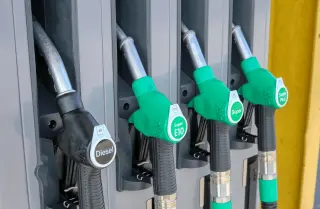
The fuel card industry in the UK is growing, with a market size of £108.3 million in 2025.
Fuel Card provider, Right Fuel Card, has conducted research into the changing landscape to understand how the industry could shift in 2026.
The fuel card landscape is growing. In 2025, the market size of the industry in the UK now stands at £108.3m, with an estimated 46 businesses in the fuel card industry. While the outlook for the fuel card industry is positive, the industry is changing, with the rise of hybrid and EV fleets, and with an increased focus on digitalisation.
To explore how healthy the current fuel card landscape is, and how this is expected to change in 2026, the team at Right Fuel Card has conducted their own internal fuel card research to see how fuel card customers are operating and the changes they are expecting to make in 2026.
40% of fuel card users are self-employed
Fuel cards are for businesses, not just individual drivers, and companies of all sizes can use them. According to Right Fuel Card, 40% of fuel card users identify as being self-employed, highlighting how freelancers and small business owners benefit from streamlined fuel management. Fuel cards allow these individuals to separate business expenses from personal ones and track spending more easily.
Businesses of varying sizes widely use fuel cards and over a third (39%) employ under ten members of staff, while just 8% belong to companies of more than ten people. This trend highlights the widespread adoption of fuel cards among smaller businesses, where managing fuel expenses efficiently can be crucial for managing cash flow.
Over a third of businesses increased fuel spending in 2025
The research also explored fuel spending habits, and while 2025 has been a difficult year economically, businesses are travelling further than they were in previous years.
According to fuel card owners, 37% of businesses increased their fuel usage in 2025. This rise in fuel consumption aligns with 27% of business owners who reported a change in mileage as the main reason for the increase. This trend suggests that businesses are undertaking more travel or longer routes, possibly in response to expanding operations. The uptick also indicates that businesses are facing challenges in managing costs, particularly with fuel prices fluctuating.
This trend highlights a sense of resilience and adaptation; businesses are prioritising mobility as a key part of their operations, even in a tough financial climate.
In 2025, nearly half of businesses (46%) spent under £500 on fuel monthly, while 32% spent between £501 and £1000. This suggests that a significant proportion of companies, particularly small and medium-sized businesses, are managing relatively modest fuel costs. These businesses may have fewer vehicles in operation, shorter travel distances, or even more fuel-efficient vehicles.
Looking ahead to 2026, these spending trends could fluctuate due to a combination of factors. Rising fuel costs, including potential increases in fuel duties, are likely to push businesses’ fuel expenditures higher, particularly for those in industries with higher mobility needs.
Which industries are using fuel cards?
Fuel cards can be used across any industry; however, in 2025, some industries dominated more than others. Industries like manufacturing (2.8%) or the arts and entertainment (1.8%) have a very limited number of fuel card users; this is likely because the industries require very little travel.
However, industries where frequent travel is required are naturally more likely to use fuel cards. Agriculture and forestry workers made up 8% of fuel card holders, while construction workers made up 14% of card holders. The industry with the most fuel card holders was transportation and storage, with 32% of cardholders working in transportation or storage. This sector's dependence on fuel for its fleet of trucks, vans, and delivery vehicles is unparalleled, making fuel cards an essential tool for managing costs, monitoring consumption, and streamlining operational processes.
43% agree that cost savings would incentivise them to invest in EV fleets
With the sale of new diesel and petrol cars still set to end in 2030, more businesses are having to adapt to an electric-led future, which will bring operational challenges.
One of the primary effects will be a shift in the capital and total cost of ownership (TCO) calculations. While EVs typically have higher upfront costs compared to traditional vehicles, they offer lower fuel and maintenance expenses over time. However, in 2026, tax changes, such as a rise in the Benefit-in-Kind (BiK) tax for EVs and the ending of certain capital allowances, may alter the financial dynamics for fleet managers.
According to fuel card customers, incentives would persuade them to make the change to EV fleets. Nearly half (43%) of customers agreed that cost savings would incentivise them to make the change, while 37% agreed that cheaper electric vehicle availability could persuade them.
Currently, only 9% of businesses in the UK operate EVs in their fleet, but for business owners, EVs are expected to become cheaper over time, thanks to a combination of factors such as increased competition in the market, lower battery costs, and improved manufacturing efficiencies. In 2025, the price of new electric vehicles (EVs) fell by about 7.7% year-on-year, with some models now available at much lower prices compared to previous years, especially in the more affordable segments.
Matthew Briggs, CEO at Right Fuel Card, commented, “As we look towards 2026, the fuel card industry in the UK is at a critical juncture, with the market showing steady growth and evolving needs. While smaller businesses have long relied on fuel cards for efficient cost management, we’re now seeing larger shifts, particularly with the rise of hybrid and EV fleets.”
“As the demand for electric vehicles increases, we recognise the need to adapt to these changes, and our research shows that cost savings and the availability of cheaper electric vehicles are key motivators for businesses looking to transition. The industry's shift towards digitalisation and sustainability is inevitable, and we’re committed to providing the tools that will help businesses navigate this transition smoothly and continue to manage fuel expenses effectively.”
For more information about Right Fuel Card, please visit: https://www.rightfuelcard.co.uk/
ENDS
About Right Fuel Card
Right Fuel Card is an independent distributor of fuel cards with a mission: to simplify the fuel management of businesses across the UK. Right Fuel Card is proud to be part of Edenred, a leading digital platform for services and payments and the everyday companion for people at work, connecting 60 million users and 2 million partner merchants in 45 countries via close to 1 million corporate clients.




